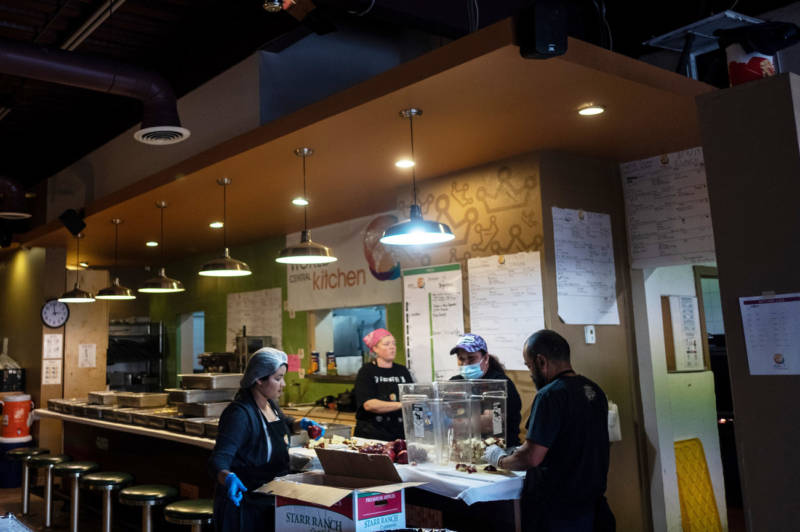For Tijuana, the Central American caravans that arrived there in November have become a humanitarian challenge. For the Trump administration, they are a national security threat, as well as a potent and convenient symbol of why the United States needs stronger border security.
"We don't know who else is in that group," said Rodney Scott, chief of the San Diego Border Patrol Sector. "The sheer numbers indicate there are nefarious people within the caravans."
In the time since the caravan arrived in early November, hundreds of migrants have lost patience and illegally jumped the border fence. Scott says his agents have arrested more than 2,500 of them in the no-man's land between steel border barriers.
On a recent visit to Tijuana, the caravan migrants looked more bedraggled than nefarious.
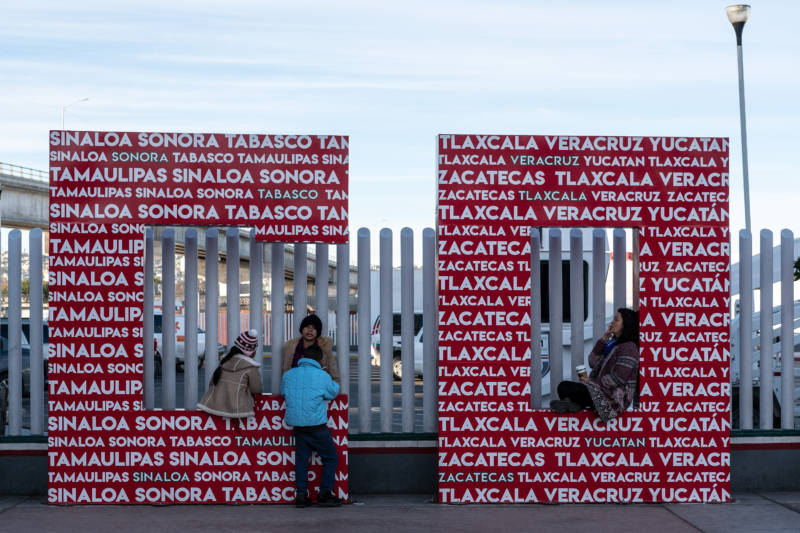
The List
Their numbers have dropped dramatically from around 6,000 to fewer than 2,000 today.
They're staying in makeshift shelters throughout the city, waiting week after week to hear their own number called out in an announcement that is made every morning in a small park near the U.S. port of entry.
"Today we begin with number 1,627. Please take your place in line," said a man with a bullhorn.
And with that, Darling Adalid Mercado is the first in a ragged line of caravan migrants who will cross the border on this morning and request asylum from U.S. immigration agents.
Each day, only 40 to 60 people are allowed in.
Adalid Mercado is a clean-cut 19-year-old in a ball cap, with a crucifix around his neck. He says he left his home in Ocotepeque, Honduras, three months ago to flee town thugs who wanted to recruit him.
He's angry at the volunteers who organized the caravan, who he says gave them bad advice.
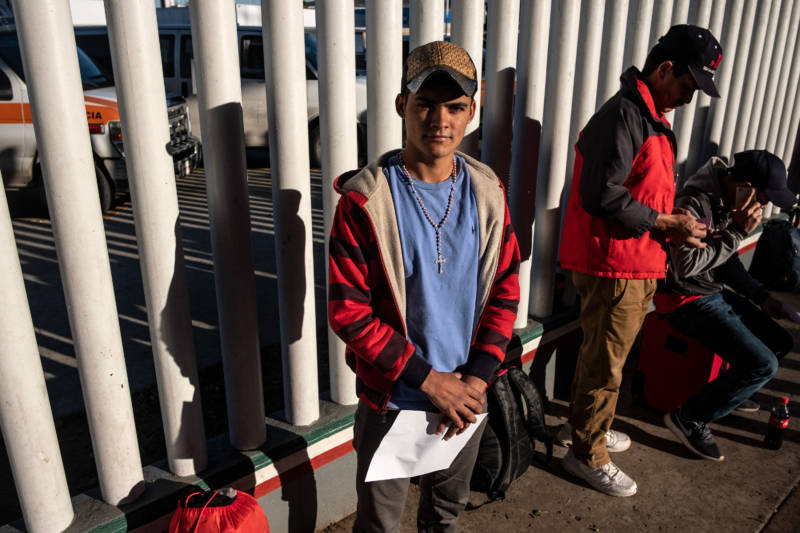
"Pueblo Sin Fronteras [Village Without Borders] is an organization that told us to join the caravan, that everything would be easy," he said. "Then you're on the road and it's really hard, really difficult. They deceive you. They say we're going to the Mexico-U.S. border and we'll all cross together. But the truth is you can't do this. It's illegal."
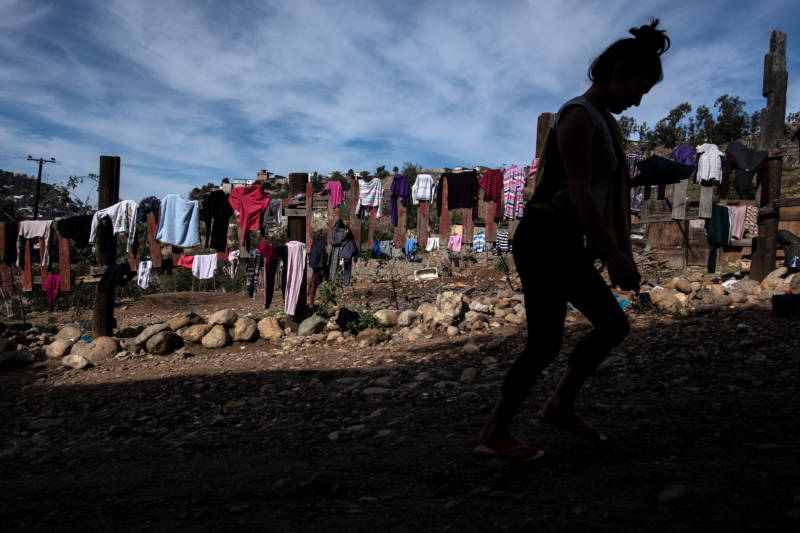
Adalid Mercado said that once he got to Tijuana, other activists goaded him," 'Come on, Darling, jump the fence!' " But he realized that he would face harsh punishment from U.S. authorities, and it was better to wait for his number to come up.
Once he crosses, if he's not sent to a migrant detention facility, Adalid Mercado wants to join his brother in San Antonio and find work.
Pueblo Sin Fronteras, which is a Mexico-based immigrant solidarity organization, posted a response on its Facebook page to recent criticism of its actions. They emphatically reject "criminalization and defamation" of their work with the caravan. The group vowed to continue to support and protect the human rights of Central American migrants in transit.
Waiting to Cross
The waiting game in the squalid shelters in Tijuana is grating on everyone's nerves.
Blanca Irias and her family, from Tegucigalpa, Honduras, are cooling their heels at a shelter run by an evangelical church called Ambassadors for Christ, situated next to a fetid creek popular with a family of mottled hogs. She is a heavyset woman with weary eyes. They have been staying in a camping tent set up in the church sanctuary.
Every day, she, her daughter, son-in-law and two grandchildren have discussed what their next move should be.
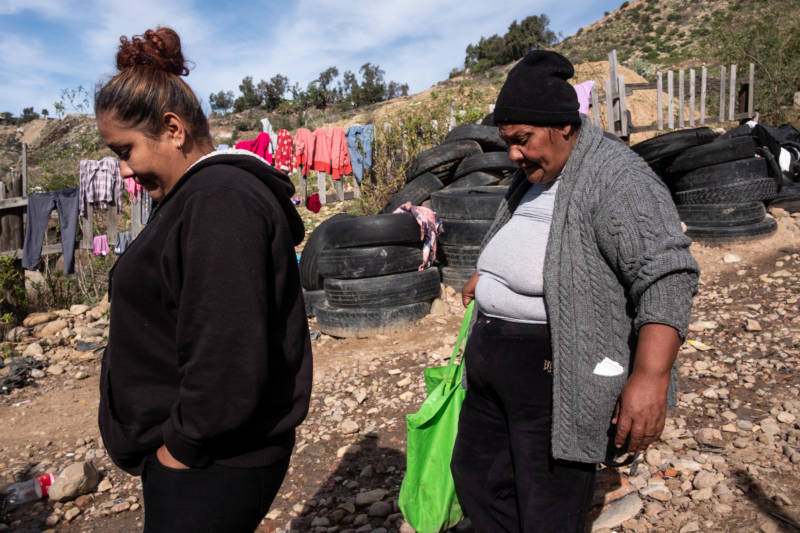
"We're frustrated," said Irias with a sigh. "We've been here a long time. We're discussing the possibility of staying here in Tijuana because there's work and it pays well. There are days when we also wonder if we should jump the fence. We don't know what we'll do."
Humanitarian Visas and a Job
More and more Hondurans, who came in the caravan, are deciding to stay in Tijuana. Mexico has issued more than 2,000 humanitarian visas that allow them to work in this booming border city on the Pacific Coast. While the town leadership initially was hostile about their arrival, many citizens have warmed up to them.
"We've seen these people working around town, in barber shops, selling clothes, taking jobs in the assembly plants," said Juan Carlos Rodriguez Marquez, a local lawyer who was walking his dog along a beachside park. "They are people who want to get ahead. We don't have any problem with them. Here in Tijuana, there's work for anybody who's willing to work."
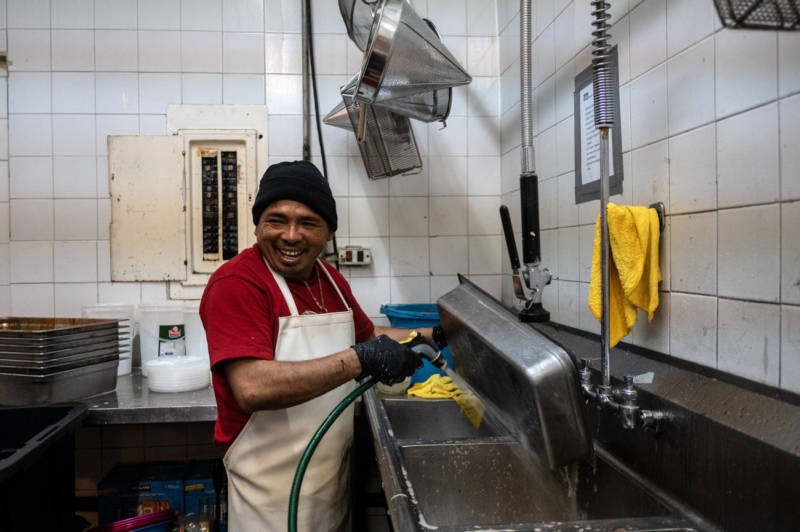
Santos Favian Gomez says he fled marauding gangs in Choluteca, Honduras. He has taken a job washing dishes for a humanitarian group, World Central Kitchen, that prepares hundreds of free meals for the migrants.
"I'll remain in Tijuana," he said. "Because I hear if you cross into the United States, they'll throw you in jail. It's better to work here than be a prisoner over there."
Favian Gomez, 41, said he traveled here alone. He plans to save a little money to send home to his wife. He said he will try to find a house so he can move out of the crowded shelter, where he is staying, and he plans to make his home in Tijuana, at least temporarily.
"It's pretty here," he said, scrubbing beans from a pan, "and the people are nice."
He said any arrangement he can work out in Tijuana is better than returning to Honduras.
